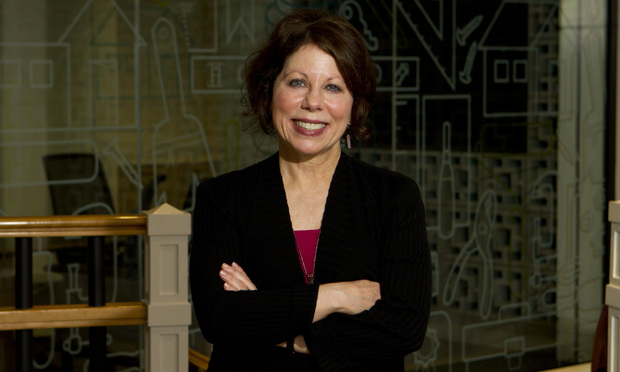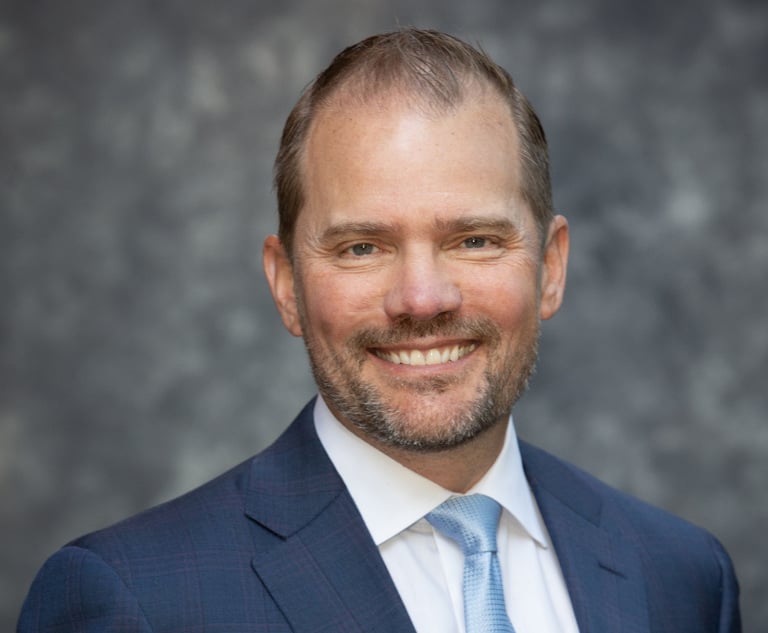Meet the GC: Hilary Harp of Habitat for Humanity International
Unlike her counterparts in the private sector, Hilary Harp doesn't spend much time worrying about outside counsel billing rates.
March 09, 2020 at 06:50 AM
4 minute read
 Hilary Harp, general counsel , Habitat for Humanity, Atlanta. (Photo: John Disney/ALM)
Hilary Harp, general counsel , Habitat for Humanity, Atlanta. (Photo: John Disney/ALM)
The most prevalent image of Habitat for Humanity International is volunteers wielding hammers and nails to build houses, so the group lawyers must do a brisk business in waivers and construction accident cases, right?
Not exactly, explains Hilary Harp, Habitat's vice president for legal and general counsel. She says that the Georgia-based nonprofit supports close to 1,200 local affiliates in the U.S. and other entities in 70 countries. The locals organize the building and selling of houses to low-income residents–so they handle legal matters stemming from the building activities.
Harp, who spent 20 years in big law firms before she joined Habitat in 2007, manages a nine-lawyer team, plus seven staffers who work in governance, risk management and compliance. They tackle large insurance programs, mortgage compliance, new market tax credit allocations, capital lending, along with contracts, fundraising development, tax; litigation and trademark issues. On the international front, they also work on the housing finance market and, in a new venture, housing microfinance.
Unlike her counterparts in the private sector, Harp doesn't spend much time worrying about outside counsel billing rates. "We are very blessed to have a large number of firms that provide pro bono support," she says, noting help from Kilpatrick Townsend & Stockton, Ford & Harrison, Perkins Coie, DLA Piper, Alston & Bird, Morgan, Lewis & Bockius and others. (Harp said her group does pay for some special projects and litigation.)
She also swings a hammer herself on occasion, saying, "Spending time in the field is really important. It really brings the mission home."
Harp, the daughter of the late Bill Harp of Arnall Golden Gregory, received her undergraduate and law degrees from the University of Georgia, then moved to Washington to work for Perkins Coie. There she worked on government contracts, commercial litigation and environmental matters.
Seeking intellectual property experience, Harp moved back to Atlanta after five years in D.C. But when she arrived at what was then Powell, Goldstein, Frazer & Murphy in 1991, she worked on Resolution Trust Corp. matters for the firm's banking practice, along with general commercial litigation.
Harp became a partner and says she "really liked working with clients" on nonlitigation matters–human resources, acquisitions and other necessities to build businesses.
She says she asked herself, "Is this what I want to do for the next 20 years?"
Then she saw an advertisement for a deputy general counsel at Habitat, which was founded in Americus, Georgia, but had opened a headquarters in Atlanta. Liz Blake, the group's general counsel, hired Harp. When Blake retired about five years ago, Harp took over.
Harp says the job offers "more payback to the soul" than her private practice work.
Two myths about Habitat for Humanity, she says, are that former President Jimmy Carter started it, and that "we give away houses."
Carter and his wife, Rosalynn, have been regular volunteers and partners since 1984, but the organization was founded in 1976 after years of development started in Americus, Georgia, by farmer and biblical scholar Clarence Jordan, according to Habitat's website.
"On the farm, Jordan and Habitat's eventual founders Millard and Linda Fuller developed the concept of 'partnership housing,'" the site says. "The concept centered on those in need of adequate shelter working side by side with volunteers to build decent, affordable houses. The houses would be built at no profit. New homeowners' house payments would be combined with no-interest loans provided by supporters and money earned by fundraising to create 'The Fund for Humanity,' which would then be used to build more homes."
This content has been archived. It is available through our partners, LexisNexis® and Bloomberg Law.
To view this content, please continue to their sites.
Not a Lexis Subscriber?
Subscribe Now
Not a Bloomberg Law Subscriber?
Subscribe Now
NOT FOR REPRINT
© 2025 ALM Global, LLC, All Rights Reserved. Request academic re-use from www.copyright.com. All other uses, submit a request to [email protected]. For more information visit Asset & Logo Licensing.
You Might Like
View All
Lawyers Can Live Worthy of the Calling They Have Received and The Gifts With Which They Have Been Blessed

Atlanta-Based Fearless Fund Ends Black-Only Entrepreneurial Grant Contest After Settling Civil Rights Lawsuit

Can You Contract Away Your Right to Leave Bad Google Reviews? Court of Appeals Set to Decide

Law Firms Mentioned
Trending Stories
- 1Rejuvenation of a Sharp Employer Non-Compete Tool: Delaware Supreme Court Reinvigorates the Employee Choice Doctrine
- 2Mastering Litigation in New York’s Commercial Division Part V, Leave It to the Experts: Expert Discovery in the New York Commercial Division
- 3GOP-Led SEC Tightens Control Over Enforcement Investigations, Lawyers Say
- 4Transgender Care Fight Targets More Adults as Georgia, Other States Weigh Laws
- 5Roundup Special Master's Report Recommends Lead Counsel Get $0 in Common Benefit Fees
Who Got The Work
J. Brugh Lower of Gibbons has entered an appearance for industrial equipment supplier Devco Corporation in a pending trademark infringement lawsuit. The suit, accusing the defendant of selling knock-off Graco products, was filed Dec. 18 in New Jersey District Court by Rivkin Radler on behalf of Graco Inc. and Graco Minnesota. The case, assigned to U.S. District Judge Zahid N. Quraishi, is 3:24-cv-11294, Graco Inc. et al v. Devco Corporation.
Who Got The Work
Rebecca Maller-Stein and Kent A. Yalowitz of Arnold & Porter Kaye Scholer have entered their appearances for Hanaco Venture Capital and its executives, Lior Prosor and David Frankel, in a pending securities lawsuit. The action, filed on Dec. 24 in New York Southern District Court by Zell, Aron & Co. on behalf of Goldeneye Advisors, accuses the defendants of negligently and fraudulently managing the plaintiff's $1 million investment. The case, assigned to U.S. District Judge Vernon S. Broderick, is 1:24-cv-09918, Goldeneye Advisors, LLC v. Hanaco Venture Capital, Ltd. et al.
Who Got The Work
Attorneys from A&O Shearman has stepped in as defense counsel for Toronto-Dominion Bank and other defendants in a pending securities class action. The suit, filed Dec. 11 in New York Southern District Court by Bleichmar Fonti & Auld, accuses the defendants of concealing the bank's 'pervasive' deficiencies in regards to its compliance with the Bank Secrecy Act and the quality of its anti-money laundering controls. The case, assigned to U.S. District Judge Arun Subramanian, is 1:24-cv-09445, Gonzalez v. The Toronto-Dominion Bank et al.
Who Got The Work
Crown Castle International, a Pennsylvania company providing shared communications infrastructure, has turned to Luke D. Wolf of Gordon Rees Scully Mansukhani to fend off a pending breach-of-contract lawsuit. The court action, filed Nov. 25 in Michigan Eastern District Court by Hooper Hathaway PC on behalf of The Town Residences LLC, accuses Crown Castle of failing to transfer approximately $30,000 in utility payments from T-Mobile in breach of a roof-top lease and assignment agreement. The case, assigned to U.S. District Judge Susan K. Declercq, is 2:24-cv-13131, The Town Residences LLC v. T-Mobile US, Inc. et al.
Who Got The Work
Wilfred P. Coronato and Daniel M. Schwartz of McCarter & English have stepped in as defense counsel to Electrolux Home Products Inc. in a pending product liability lawsuit. The court action, filed Nov. 26 in New York Eastern District Court by Poulos Lopiccolo PC and Nagel Rice LLP on behalf of David Stern, alleges that the defendant's refrigerators’ drawers and shelving repeatedly break and fall apart within months after purchase. The case, assigned to U.S. District Judge Joan M. Azrack, is 2:24-cv-08204, Stern v. Electrolux Home Products, Inc.
Featured Firms
Law Offices of Gary Martin Hays & Associates, P.C.
(470) 294-1674
Law Offices of Mark E. Salomone
(857) 444-6468
Smith & Hassler
(713) 739-1250






